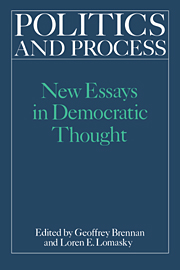Book contents
- Frontmatter
- Contents
- Acknowledgments
- List of contributors
- Introduction
- Chapter 1 The justification of democracy
- Chapter 2 Large numbers, small costs: the uneasy foundations of democratic rule
- Chapter 3 Evaluating the institutions of liberal democracy
- Chapter 4 Democracy: the public choice approach
- Chapter 5 The democratic order and public choice
- Chapter 6 Radical federalism: responsiveness, conflict, and efficiency
- Chapter 7 Contractarian presuppositions and democratic governance
- Chapter 8 In quest of the social contract
- Chapter 9 Rationality and the justification of democracy
- Chapter 10 The morality of democracy and the rule of law
- Index
Chapter 8 - In quest of the social contract
Published online by Cambridge University Press: 29 September 2009
- Frontmatter
- Contents
- Acknowledgments
- List of contributors
- Introduction
- Chapter 1 The justification of democracy
- Chapter 2 Large numbers, small costs: the uneasy foundations of democratic rule
- Chapter 3 Evaluating the institutions of liberal democracy
- Chapter 4 Democracy: the public choice approach
- Chapter 5 The democratic order and public choice
- Chapter 6 Radical federalism: responsiveness, conflict, and efficiency
- Chapter 7 Contractarian presuppositions and democratic governance
- Chapter 8 In quest of the social contract
- Chapter 9 Rationality and the justification of democracy
- Chapter 10 The morality of democracy and the rule of law
- Index
Summary
To what extent should we regard the most fundamental principles of a just society as the subject of an agreement, actual or hypothetical? In this essay I look at two famous recent approaches to this question. Then I suggest a more general framework for considering the problem. I begin with brief discussions of the contrasting approaches of James Buchanan and John Rawls.
I would like to focus on a basic issue at the center of both theories: Can a hypothetical choice motivated by self-interest yield unique and significant results and, at the same time, preserve impartiality? By yielding unique and significant results, I mean establishing nonintuitionist first principles (solving the “priority problem”) for either the general question of political procedures considered by Buchanan or the even broader question of the distribution of primary goods considered by Rawls.
Both the Buchanan and Tullock constitutional convention and the Rawlsian original position appeal to hypothetical self-interest under fair or impartial conditions. In each case the following problem arises: Can we know enough about our self-interest to choose one and only one first principle and, at the same time, not know so much that the choice has been biased in our own favor? I will claim, on the one hand, that the Buchanan and Tullock contractors, operating from behind a thin veil, know too much and, on the other hand, that the Rawlsian contractors, operating from behind a thick veil, know too little.
- Type
- Chapter
- Information
- Politics and ProcessNew Essays in Democratic Thought, pp. 183 - 193Publisher: Cambridge University PressPrint publication year: 1989
- 3
- Cited by

